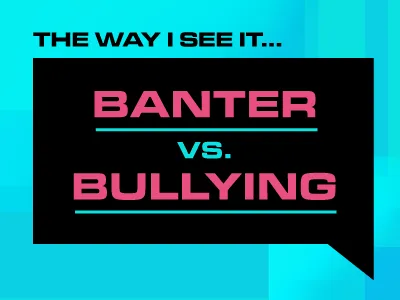
How To Speak To Your Friends When The Banter Gets Too Much
Include this article in your Skills Builder Journal. It could help you develop... ![]()


It’s Anti-Bullying Week and we’re looking at the difference between banter and bullying. Anti-bullying charity The Diana Award are here with their top tips and advice…
Banter can be a great way to share a joke between friends and feel connected to others but what can we do when the banter crosses into bullying behaviour? The Diana Award defines bullying behaviour as ‘repeated, negative behaviour that is intended to make someone feel upset, uncomfortable or unsafe’ and defines banter as ‘when someone is in on the joke’.
We encourage you to reflect on how your friends’ behaviour makes you feel – are you in on the joke or do you feel upset, uncomfortable or unsafe? This Anti-Bullying Week, we’ve asked Rose and Harman from The Diana Award’s Youth Board for their top tips on how to speak to your friends when the ‘banter’ becomes bullying behaviour.
Tell Your Friends How You’re Feeling
It can be difficult to tell your friends that their 'jokes' are having an impact on you - especially when everyone else seems to be laughing at your expense. There's the fear of being called a snitch, being labelled as someone who can't take a joke or even as a liar but the fact is, if you ever find yourself in such a situation, it is important to be brave and to speak out. When this sort of behaviour is not flagged, it can develop into something much worse and it may become more than a simple misunderstanding if your friends don’t realise how their behaviour makes you feel. Once they know how their behaviour is affecting you, they have the opportunity to change their behaviour, so it’s important to tell friends when the banter stops and turns into bullying behaviour.

Pick the Right Time and Place
Choosing to talk to your friends can be stressful and a big decision. To help ease the process, consider how you best convey your thoughts to a friend. Consider where to have this conversation – in the middle of a busy canteen is perhaps not the best place! You may feel most comfortable speaking in person during a quiet moment or prefer to write your thoughts and feelings down in a letter. There are many ways to do it and it is essential that you feel comfortable whilst speaking out. Don’t let yourself get stressed out by over-thinking where or how to do it either though! Navigate the situation to what makes you feel most comfortable. Try your best to talk with your friends in a calm manner and explain how they've made you feel; you will feel all the better for doing so and you may even set an example for people who are experiencing something similar.
Consider Who To Talk To
When you have many friends or a big friendship group, it may feel daunting or scary to talk to them all at once; you may find it easier to speak to an individual or smaller group, rather than a collective. This way, you can focus on a one-on-one conversation. It all depends on who you are and how you feel. Consider if you could bring along one or two friends to support you when speaking to others.

Prepare What To Say
By preparing what you want to say to your friends in advance, you will feel more comfortable leading the conversation. You may like to start by explaining how their behaviour has affected you, how it made you feel and then ask that they change their behaviour. If they are your friends, they will want to support you and ensure you feel comfortable. It can also help to consider in advance how you want things to change and what you need from your friends to continue the friendship.
If Talking To Friends Doesn’t Help
If talking to friends does not bring about the resolution that you wished for, speak to a trusted adult like a teacher or parent/carer. Try not to blame yourself if you didn’t receive the desired outcome. Often, people who have not experienced something directly may struggle to understand and if your friends don’t change their behaviour after you’ve spoken to them, they aren’t really your friends. By speaking with a trusted adult about what has been happening, they will be able to offer support and help you to move forward.

For Further Support
There are lots of organisations and people who care about you and your wellbeing – don’t suffer in silence and reach out if you are struggling.
The Diana Award Crisis Messenger provides free, 24/7 crisis support across the UK. If you are a young person, you can text DA to 85258. Trained volunteers will listen to how you’re feeling and help you think through the next step towards feeling better.
For further support and resources check out antibullyingpro.com/support and antibullyingpro.com/resources.
Find Out More
Find out more about The Diana Award’s Youth Board at https://diana-award.org.uk/stories/national-anti-bullying-youth-board/
Find out more about Anti-Bullying Week at https://www.antibullyingpro.com/take-action/anti-bullying-week
Find out more about The Diana Award’s Anti-Bullying Ambassador Programme at https://diana-award.org.uk/anti-bullying-training/




